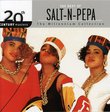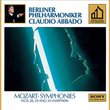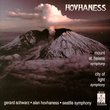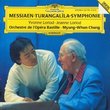| All Artists: William [composer] Walton, Paul Daniel, English Northern Philharmonia Title: William Walton: Symphony No. 1; Partita Members Wishing: 0 Total Copies: 0 Label: Naxos Release Date: 9/8/1998 Genre: Classical Styles: Historical Periods, Modern, 20th, & 21st Century, Symphonies Number of Discs: 1 SwapaCD Credits: 1 UPC: 730099418027 |
Search - William [composer] Walton, Paul Daniel, English Northern Philharmonia :: William Walton: Symphony No. 1; Partita
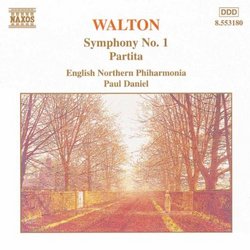 | William [composer] Walton, Paul Daniel, English Northern Philharmonia William Walton: Symphony No. 1; Partita Genre: Classical
Walton's First Symphony caused the composer enormous trouble. Always a slow worker, only the first three movements were ready at the time of the premiere in the mid-1930s, and the finale was long in coming. For that reason... more » |
Larger Image |
CD DetailsSynopsis
Amazon.com Walton's First Symphony caused the composer enormous trouble. Always a slow worker, only the first three movements were ready at the time of the premiere in the mid-1930s, and the finale was long in coming. For that reason, many critics have felt that the last movement doesn't have the same sort of concentration as do the first three. Whether or not you agree, there's no question that this is an exciting conclusion, especially with the crashing entrance of the full percussion section at the finale's climax. This excellent performance comes as a big surprise: at a budget price and with a less-than-well-known orchestra, it's a dynamic and very impressive effort. The energetic Partita, a later work, makes a great companion piece. --David Hurwitz Similar CDs
Similarly Requested CDs
|
CD ReviewsGood low-priced recording of Masterpiece!! mahlerii@aol.com | Richfield, MN | 08/15/1999 (4 out of 5 stars) "In reviewing any recording of Walton's First one must think of Andre Previn. His recording was a ground-breaker in the 60's and it was lamentably out of print here in the US. He later recorded it for Telarc in the 1980's and the here the performance is more world-weary. The first one is more brillant, but it is a young-man's view. The Royal Philharmonic is struggling on the Telarc disc, but the focus of this symphony is struggle-massive struggle, and the work benefits from this much more in Previn's second performance. Daniel comes very close in approaching Previn's. What I disagree with seems to be his disruptions of the natural flow of the music. It seems that there is more rubato here than in other performances. Daniel also does some strange dymamic contrasts-such as the paragraph leading to the development section of the first. The music should just keep building and building. The other movements have the same excellent quality without the personal stamp that Previn puts on both recordings. If you do not have any other avenues for this work, PLEASE buy the Naxos recording or you are missing out on one of the 20th century's most riveting symphonies. Then if you find other recordings, compare. That is what is most fun about multiple recordings of works. It's just that I can't recommend this as the benchmark performance. Previn gets that nod." Steel Sinews and All Thomas F. Bertonneau | Oswego, NY United States | 10/24/2000 (5 out of 5 stars) "The locus classicus among recorded performances of William Walton's (1902-1983) First Symphony (1934) has to be the first-ever playback version, from 10 and 11 December 1935, with the London Symphony Orchestra under Sir Hamilton Harty - cut legendarily in a freezing warehouse loft in the early hours of the morning. This rip-roaring dash through the score has circulated on CD and will probably reappear. When it does, by all means snap it up. Many modern recorded versions of the First compete for listener attention. Sir Malcolm Sargent made an early stereo LP, very fine; Boult, Gibson, Previn, Thomson, and virtually every British conductor of note has tackled it, sometimes more than once. After Elgar's First, Walton's might be the most-recorded of British symphonies. So how does one choose? Given the equal merit of many of the choices, price certainly becomes a legitimate criterion, and this means that Paul Daniel's "take," with the English Northern Sinfonia, on Naxos makes serious demands on our attention. The perfect interpretation of the work must infuse the First Movement with the highest possible charge of subterranean energy and it must let that energy burst forth in the wild horn-call dominated passages about three-quarters of the way through. The Scherzo needs to be electrical; the Andante must be tense, and the Finale must be exceptionally athletic. Daniels manages all of this and more, with spectacular clarity from his engineers. The English Northern Sinfonia has been around for a long time under variants of its name and is a thoroughly professional ensemble. The Partita is a much later work, less serious, but no less muscular than the Symphony; it has enjoyed far fewer recordings than the Symphony, so it is welcome as the (ample) makeweight. The notes are excellent, better than in many full-price CDs. If you don't already know the Walton First, you're in for a treat." Underpowered and uncompetitive R. Ball | London W14, England United Kingdom | 11/23/2000 (2 out of 5 stars) "There are three or four really great recordings of Walton's first and this version doesn't come off well in any comparison. The best is Previn's RCA recording with the LSO and no other attempt before or since has captured the seething tension of the 1st mov., the ferocity of the 2nd., repose and exaltation of the 3rd. & 4th. anything like as vividly. At least in Britain the Previn RCA version is available almost as cheaply as the Naxos, which therefore has no price advantage. Other versions it is also well worth having is the first ever under Hamilton Harty (originally released as 3 movements before the finale was composed) and the excellent Malcolm Sargent EMI version. The old Adrian Boult and more recent Leonard Slatkin versions are also very good."
|

 Track Listings (7) - Disc #1
Track Listings (7) - Disc #1